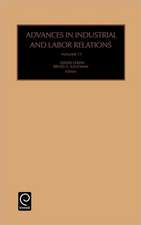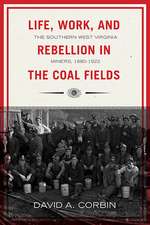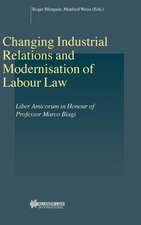Working Class Radicals: The Socialist Party in West Virginia, 1898-1920: WEST VIRGINIA & APPALACHIA, cartea 14
Autor Frederick A. Barkey Cuvânt înainte de KEN FONES-WOLFen Limba Engleză Paperback – apr 2012
Working Class Radicals: The Socialist Party in West Virginia, 1898-1920 examines the rise and fall of organized socialism in West Virginia through an exploration of the demographics of membership, oral interview material gathered in the 1960s from party members, and the collapse of the party in the wake of the Paint Creek-Cabin Creek coal-mining strike of 1912. The first local branch of the West Virginia Socialist Party was established in Wheeling in 1901 and by 1914 several thousand West Virginians were dues-paying members of local branches. By 1910 local Socialists began to elect candidates to office and in 1912 more than 15,000 West Virginian voters cast their ballots for Socialist presidential candidate Eugene Debs. The progress that West Virginia socialists achieved on the electoral front was a reflection of the party’s strategy of increasing class-consciousness by working with existing unions to build the power of the labor movement. The party appealed to a fairly broad cross section of wage earners and its steady growth also owed much to the fact that many members of the middle class were attracted to the cause. Several factors combined to send the party into rapid decline, most importantly deep fissures between class and craft factions of the party and 1915 legislation making third party political participation difficult. Working Class Radicals offers insight into the various internal and external forces that doomed the party and serves as a cautionary tale to contemporary political leaders and organizers.
| Toate formatele și edițiile | Preț | Express |
|---|---|---|
| Paperback (1) | 149.12 lei 3-5 săpt. | |
| West Virginia University Press – apr 2012 | 149.12 lei 3-5 săpt. | |
| Hardback (1) | 396.09 lei 3-5 săpt. | |
| West Virginia University Press – 31 mar 2012 | 396.09 lei 3-5 săpt. |
Din seria WEST VIRGINIA & APPALACHIA
-
 Preț: 158.10 lei
Preț: 158.10 lei -
 Preț: 210.64 lei
Preț: 210.64 lei -
 Preț: 240.00 lei
Preț: 240.00 lei -
 Preț: 181.23 lei
Preț: 181.23 lei -
 Preț: 141.70 lei
Preț: 141.70 lei -
 Preț: 164.10 lei
Preț: 164.10 lei -
 Preț: 168.42 lei
Preț: 168.42 lei -
 Preț: 147.17 lei
Preț: 147.17 lei -
 Preț: 150.26 lei
Preț: 150.26 lei - 11%
 Preț: 392.20 lei
Preț: 392.20 lei -
 Preț: 148.11 lei
Preț: 148.11 lei -
 Preț: 170.92 lei
Preț: 170.92 lei -
 Preț: 148.90 lei
Preț: 148.90 lei -
 Preț: 148.98 lei
Preț: 148.98 lei -
 Preț: 147.48 lei
Preț: 147.48 lei -
 Preț: 158.40 lei
Preț: 158.40 lei - 11%
 Preț: 435.10 lei
Preț: 435.10 lei -
 Preț: 143.99 lei
Preț: 143.99 lei -
 Preț: 154.41 lei
Preț: 154.41 lei -
 Preț: 212.82 lei
Preț: 212.82 lei -
 Preț: 196.29 lei
Preț: 196.29 lei -
 Preț: 196.29 lei
Preț: 196.29 lei
Preț: 149.12 lei
Nou
Puncte Express: 224
Preț estimativ în valută:
28.53€ • 29.90$ • 23.59£
28.53€ • 29.90$ • 23.59£
Carte disponibilă
Livrare economică 21 martie-04 aprilie
Preluare comenzi: 021 569.72.76
Specificații
ISBN-13: 9781935978459
ISBN-10: 1935978454
Pagini: 240
Dimensiuni: 152 x 229 x 28 mm
Greutate: 0.5 kg
Ediția:1
Editura: West Virginia University Press
Colecția West Virginia University Press
Seria WEST VIRGINIA & APPALACHIA
ISBN-10: 1935978454
Pagini: 240
Dimensiuni: 152 x 229 x 28 mm
Greutate: 0.5 kg
Ediția:1
Editura: West Virginia University Press
Colecția West Virginia University Press
Seria WEST VIRGINIA & APPALACHIA
Recenzii
“A catalyst inspiring additional research into West Virginia’s political past. A starting point for all current and future inquiry into West Virginia’s past and the history of socialism in the United States.” Kevin T. Barksdale, Assistant Professor of History, Marshall University
Notă biografică
Frederick A. Barkey is Professor Emeritus, Marshall University and Founder of the West Virginia Labor History Association. Ken Fones-Wolf is Professor of History and Stuart and Joyce Robbins Chair, West Virginia University.
Descriere
Working Class Radicals: The Socialist Party in West Virginia, 1898-1920 examines the rise and fall of organized socialism in West Virginia through an exploration of the demographics of membership, oral interview material gathered in the 1960s from party members, and the collapse of the party in the wake of the Paint Creek-Cabin Creek coal-mining strike of 1912. The first local branch of the West Virginia Socialist Party was established in Wheeling in 1901 and by 1914 several thousand West Virginians were dues-paying members of local branches. By 1910 local Socialists began to elect candidates to office and in 1912 more than 15,000 West Virginian voters cast their ballots for Socialist presidential candidate Eugene Debs. The progress that West Virginia socialists achieved on the electoral front was a reflection of the party’s strategy of increasing class-consciousness by working with existing unions to build the power of the labor movement. The party appealed to a fairly broad cross section of wage earners and its steady growth also owed much to the fact that many members of the middle class were attracted to the cause. Several factors combined to send the party into rapid decline, most importantly deep fissures between class and craft factions of the party and 1915 legislation making third party political participation difficult. Working Class Radicals offers insight into the various internal and external forces that doomed the party and serves as a cautionary tale to contemporary political leaders and organizers.





















